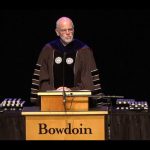
Kai Wise ’18, next to the Pacific Crest Trail sign. Mt. Hood is in the background.
This spring while researching a paper for an environmental studies class, William “Kai” Wise ’18 ended up with a job offer.
When the rising sophomore was home in Portland, Oregon, for spring break, he took some time to visit and research Timberline Lodge, a historic resort on Mt. Hood built by Civilian Conservation Corps and Works Progress Administration laborers.
President Franklin D. Roosevelt dedicated the lodge in 1937, “establishing Timberline as a multi-use landscape where the government played a central role in creating a place where historical, cultural, commercial and recreational forces would all coexist in harmony,” Wise wrote in his paper for his class Environment and Culture in North American History, taught by Associate Professor of History and Environmental Studies Matt Klingle.
Wise argued in his thesis that the Timberline project symbolizes an important moment when our society broadened its view of nature as a place where both labor and leisure could coincide. “It was a revolutionary idea to dedicate labor towards the recreational enjoyment of nature — by building a lodge — at the time,” he noted.
After Wise interviewed the curator of Timberline, she invited him to apply for a summer internship at the resort, which is overseen by the U.S. Forest Service. Wise jumped at the chance. Not only has his family been coming to ski at Timberline since he was in utero, he said he is drawn to places that embody history. “I’m really interested in describing and telling historical stories,” he said. “Everything here has a story.”

A WPA mural, “Spring on the Mountain,” in Timberline’s lower lobby
This summer, Wise is working as a ranger giving tours to some of the lodge’s two million annual visitors and advising people about local hikes. In addition, he is assisting the curator, whose job is to maintain and preserve the lodge, which was built with native timber and stone. Inside, artisans in the 1930s created mosaics, crafted lights and painted murals. “Everything in the lodge was hand built,” Wise said. “Blacksmiths did the iron work; weavers wove the curtains and rugs.”
Wise received a Delta Sigma Arts Fellowship to support him financially this summer. The grant is part of Bowdoin Career Planning’s funded internship program, which each year funds select students who want to pursue unpaid summer opportunities.
Wise, who recently became an EMT, said he is considering a possible career in public health because he is interested in environmental health, disease and the relationship between people and places.
This summer, he has plenty of time to ponder place, people, history and his own future. He doesn’t have access to the Internet in the place he is staying, and during his days off, he hikes or writes letters and poems. “I take a tent, climb to 9,000 feet and hang out up there,” he said. “It’s a bit of a writer’s retreat.”
In a sense, he is reliving through his summer work what some of the 1930s Timberline workers might have experienced. “One of the most fascinating things I’ve been researching is that while the WPA and CCC were programs intended to heal the nation’s economy and nature’s landscape, they were also intended to rejuvenate and restore the workers as they restored the land,” Wise wrote in an email. “I feel as if I’m experiencing the same phenomenon, broadening and restoring myself through nature while preserving it and sharing it with others.”
